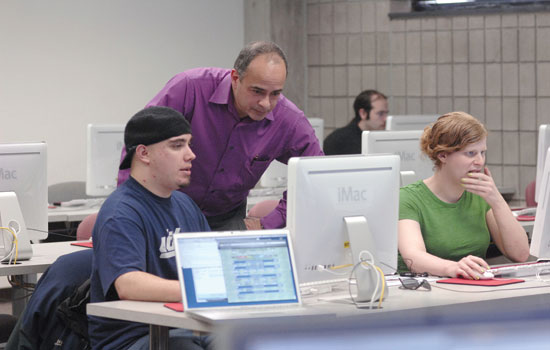RIT music director wins prestigious fellowship
RIT music professor Michael Ruhling is taking a sabbatical this fall to pursue research related to his fellowship.
Music has the ability to communicate without words and to re-create moments from past eras.
RIT music professor and orchestra conductor Michael Ruhling discovers hidden musical nuggets of the past. He and other musicologists are immersed in the spirit of uniting contemporary audiences with centuries old ideas conveyed between musicians and audiences in the 18th century.
The Handel and Haydn Society appointed Ruhling as the Christopher Hogwood Research Fellow for the 2008-2009 season because of his passion for historically informed performances. Ruhling is taking sabbatical this fall quarter in order to complete the main research and writing tasks.
The Boston-based Handel and Haydn Society will use Ruhling’s vision, passion and scholarly research to support the performance of its 18th-century repertoire. He describes this research as “the coming together of scientific observation and research, acoustics, psychology of sound, understanding of manufacturing methods, cultural context, human reaction, and artistic creativity in order to communicate concepts musically in a way that is understandable.”
“The Handel and Haydn Society,” Ruhling explains, “is a period orchestra, begun in 1815, that today uses instruments modeled after those played during the time period of Haydn, Mozart, Handel and Bach.” Historically informed performance uses period instruments, same number of players to approximate the orchestras of the day, duplicate room conditions and other factors.
As the Historically Informed Performance Research Fellow, Ruhling will write program notes for each concert, give lectures at various functions, and organize symposia for the purpose of education and promotion. He will prepare in-depth online essays for patrons intended to deepen their awareness of performances and to develop new perspectives. He will also advise on performance practice issues and future repertoire.
Ruhling believes it is also important for research to uncover what the 18th-century composers intended to say with the music. Historically informed performance is not based on modern tastes and expectations but rather on the time it was actually performed.
“We want to find what it was that made Haydn’s, Handel’s or Bach’s music unique, yet able to ‘say something’ to the audiences of the day,” Ruhling says, “Then we bring that lively interaction to present-day audiences and reproduce what was a unique and lively musical communication between musicians and audiences.”
The Handel and Haydn Society will celebrate the 200 and 250-year anniversary deaths of Haydn and Handel respectively in 2009.
Ruhling also presides over the newly formed continental organization Haydn Society of North America as its first president. He has written a book and delivered several papers on the symphonies of Joseph and Michael Haydn.







